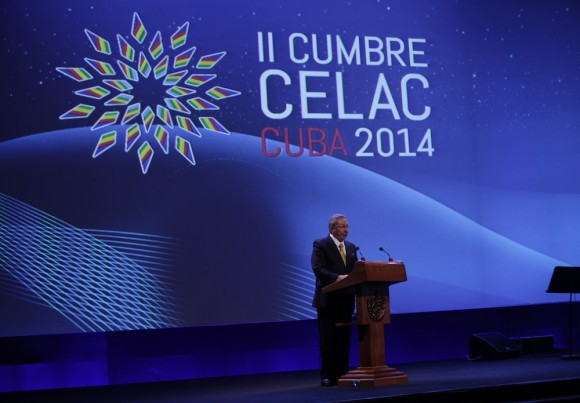
CELAC: A common vision of a Great Motherland
Excerpts from the speech by Raúl Castro inaugurating the CELAC summit. This is an unofficial translation by Progreso Weekly.

The period since the last Summit of the CELAC has been complex but fruitful.
We, the countries of Latin America and the Caribbean, have had to face numerous challenges. The crisis has continued to affect the world economy, the dangers to peace remain present in various parts of the world and sister nations have been the targets of threats, unilateral coercive measures and international legal claims because of the legitimate actions they have taken in defense of their sovereignty.
However, we have been able to move forward in the construction of the CELAC and have given continuity to the decisions we agreed to in Caracas and Santiago, Chile. […]
As I said in Santiago de Chile, “we know that among us exist different thoughts and even differences, but the CELAC has emerged from two hundred years of struggle for independence and is based on a deep community of objectives. Therefore, the CELAC is not a series of mere meetings or pragmatic coincidences but a common vision of the Great Latin American and Caribbean Motherland that is due only to their people. ”
The creation of a common political space should be a priority, in which we move toward the attainment of peace and respect between our nations, in which we are able to overcome the objective obstacles and those that are intentionally imposed upon us, in which we can utilize our resources in a sovereign manner and for the common good, and make our scientific and technical capabilities available for the progress of our peoples, in which we assert inalienable principles, such as self-determination, sovereignty and the sovereign equality of the States.
Only thus can we negate the assertion that Latin America and the Caribbean are the most unequal region in the world. […]
Regardless of our progress, we still live in a world ruled by an unjust and exclusionary international order in which the threats to peace and external interference in the region continue.
We cannot forget the long history of intervention in internal affairs, military invasions and bloody coups d’état. The so-called “power centers” do not resign themselves to lose control of this rich region nor will renounce their attempts to change the course of history in our countries to regain their lost influence and benefit from its resources.
In 1999, when there was no longer a socialist bloc, NATO modified its strategic concept to act against alleged global threats in an offensive manner, outside the territory of the member states of the Alliance, in what it called the “Euro-Atlantic periphery.” At the Summit of the EU and Latin America and the Caribbean held shortly thereafter, in June in Rio de Janeiro, the historic leader of the Cuban Revolution, Fidel Castro Ruz, asked if our region fell within that “periphery” and was subject to that increasingly more aggressive and dangerous doctrine. That question remains unanswered to this day, 15 years later. […]
Last year was unveiled the existence of a global system of communications espionage by the government of the United States, which indiscriminately targeted heads of State and Government, international organizations, political parties, businesses and citizens of the region, in flagrant violation of international law and the sovereignty of States.
Another issue of great concern for its potential to cause international conflicts is the covert and illegal use, by individuals, organizations and states, of the computer systems of other nations to attack third countries. Some governments have expressed even the possibility of responding to such attacks with conventional weapons. The only way to prevent and address these new threats is the joint cooperation among all States, as well as keeping cyberspace from becoming a theater of military operations.
We welcome, therefore, the initiative of the Brazilian government to hold in Sao Paulo, in April 2014, the Global Multisector Meeting on Internet Governance. […]
We reiterate our fullest solidarity with Argentina in its claim to the Malvinas Islands, South Georgia and South Sandwich Islands and adjacent seas. At the same time we reject any attempt to exploit, before an agreement has been achieved, the natural resources of these territories, including the subsoil. We call on the United Kingdom to accept dialogue and negotiation, as requested the Argentine government.
As the Puerto Rican poet Lola Rodriguez de Tio wrote, “Cuba and Puerto Rico are of a bird the two wings,” so I reiterate that “our community will be incomplete so long as the seat of Puerto Rico is missing, a sister nation that is genuinely Latin American and Caribbean yet suffers from a colonial situation.”
We convey our solidarity with the people and government of Ecuador, threatened by the demands of transnational corporations in courts biased by greed and a neocolonial political outlook.
I thank everyone for the expressions of solidarity in the face of the criminal blockade imposed upon my country for over half a century and the unfair inclusion of Cuba on the list of state sponsors of terrorism by the Department of State of the United States.

